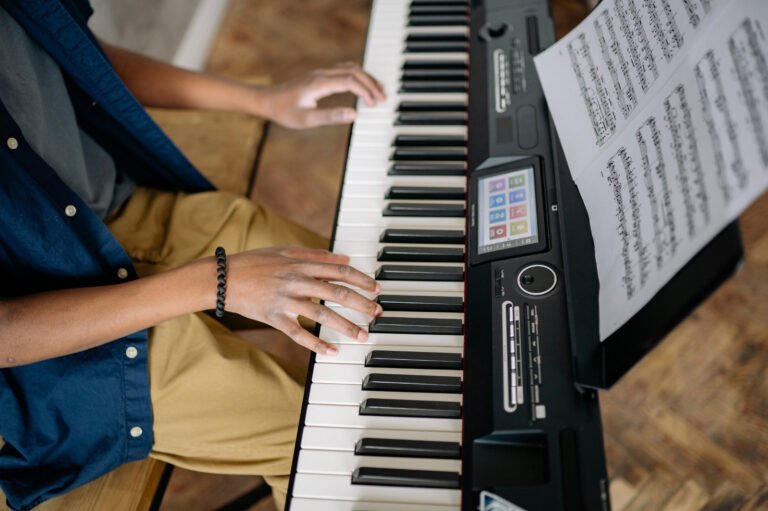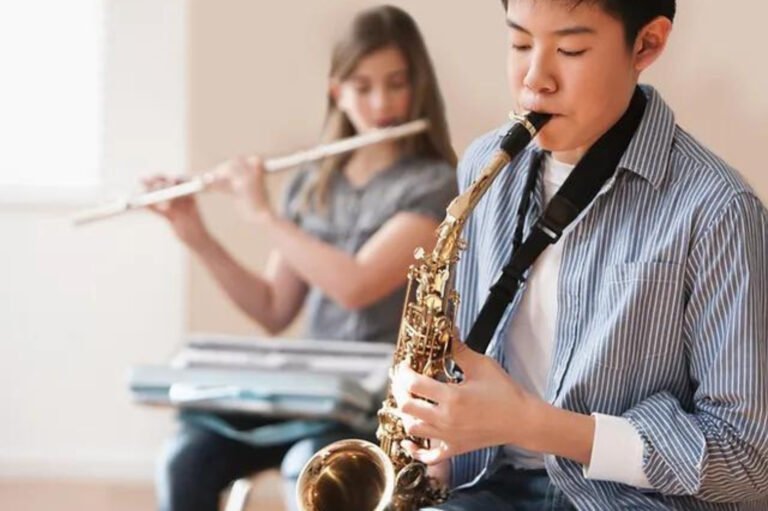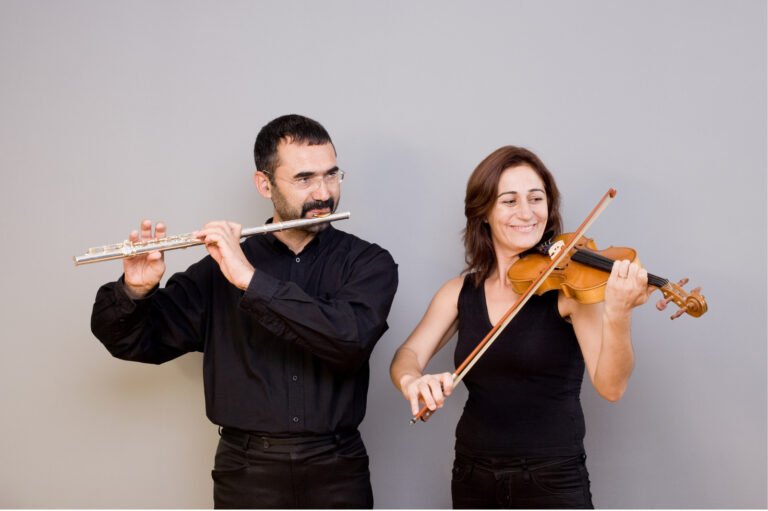Strike a Chord for Wellness: 8 Surprising Benefits of Playing an Instrument
"
In this article, You will learn eight positive effects, including improved cognitive function, hand-eye coordination, stress levels, self-discipline, time management skills, mood, self-confidence, and social connections.
So explore the benefits of playing an instrument and learn how it can enhance your life.
Let's dive right in..
- Table of Content
- Playing an Instrument Improves Cognitive Functions
- Playing an Instrument improves Hand-eye coordination
- Playing an instrument reduces stress and anxiety levels
- Playing an instrument Increases the ability to focus
- Playing an instrument increases self-discipline and time management skills
- Playing an instrument improves Overall Mood and Sense of Well-Being
- An individual’s self-confidence increases when they start playing an instrument.
- Playing an Instrument allows social connection
- Final Thoughts
It’s no secret that music has the power to move us, but have you ever wondered how playing an instrument affects your brain?
Whether an experienced musician or just starting, playing an instrument can profoundly impact your brain and overall well-being.
Playing an instrument is a creative and rewarding activity that offers loads of benefits for both the brain and overall wellness. It requires physical and mental skills, including hand-eye coordination, fine motor skills, and reading and interpreting musical notation.
Playing an instrument also involves creativity and expression, as musicians use their instruments to convey emotions and tell stories through music. So
Let’s dig deeper into how playing a musical instrument benefits your brain!
8 Surprising Benefits of Playing an Instrument:
You can attribute the popularity of Anime in India to several cultural factors.
1. Playing an Instrument Improves Cognitive Functions
Improved cognitive function is one of the most significant benefits of playing an instrument, and it can positively impact overall wellness. Studies have shown that playing an instrument can improve.
- Memory
- Attention
- Language processing skills
which are essential for maintaining cognitive health.
Playing an instrument also requires focus and concentration, which can help improve attention and reduce distractions. This can be particularly helpful for individuals who struggle with ADHD or other attention-related disorders.
Moreover, learning and mastering a new instrument can also provide a sense of accomplishment and self-confidence, contributing to overall well-being.
Key Takeaway
Improved cognitive function due to playing an instrument is a decisive benefit that can positively impact overall wellness.
2. Playing an Instrument improves Hand-eye coordination
Hand-eye coordination is essential for maintaining physical wellness and independence, particularly as we age. Playing an instrument can help improve hand-eye coordination, benefiting overall wellness.
Learning an instrument requires precise hand movements, which can help individuals develop better hand-eye coordination. Improved hand-eye coordination can lead to greater independence in daily tasks such as cooking, cleaning, and driving.
Playing an instrument can provide a sense of relaxation and mindfulness, which can reduce stress levels and promote overall well-being.
Moreover, it can be a form of self-expression and creativity, promoting feelings of joy and fulfillment.
Key Takeaway
Improved hand-eye coordination due to playing an instrument can lead to physical wellness while promoting relaxation, mindfulness, and creativity.
3. Playing an instrument reduces stress and anxiety levels
Reduced stress and anxiety levels are important aspects of overall wellness, and playing an instrument has been shown to impact both positively.
Playing an instrument can be a form of meditation, allowing individuals to focus on the present moment and let go of external stressors.
Playing an instrument’s rhythmic and repetitive nature can help induce a state of relaxation and promote the release of feel-good hormones like dopamine and endorphins, which can help reduce stress and anxiety levels.
Playing music with others can help us to create social connections, which can help reduce feelings of isolation and promote a sense of belonging. This can particularly benefit individuals experiencing social anxiety or other mental health conditions.
Key Takeaway
Learning and playing an instrument can provide a sense of relaxation and mindfulness, which can help reduce stress levels and promote overall well-being.
4. Playing an instrument Increases the ability to focus
Increased ability to focus is a critical aspect of overall wellness, and playing an instrument has been shown to impact this skill positively.
It can also be a form of mindfulness, allowing individuals to focus on the present moment and let go of distractions.
By improving concentration, attention span, and discipline, playing an instrument can increase productivity and success while promoting a sense of accomplishment, creativity, and self-confidence.
Key Takeaway
Learning and playing an instrument requires concentration and attention to detail, which can help improve focus and attention span.
5. Playing an instrument increases self-discipline and time management skills
Learning to play a musical instrument can improve one’s self-discipline and time management skills.
Here are some ways how:
Playing an instrument requires consistent practice and repetition, which can help individuals develop better time management skills. This can be particularly beneficial for individuals who may struggle with procrastination.
Moreover, playing an instrument can be a form of stress relief and self-care, which can help individuals better prioritize their time and take care of their overall well-being.
Key Takeaway
Playing an instrument can contribute to overall wellness by reducing stress, improving cognitive function and memory, fostering social connections, and promoting a sense of fulfillment.
6. Playing an instrument improves Overall Mood and Sense of Well-Being
Learning and playing an instrument can help individuals better understand and express their emotions through music. This can promote greater self-awareness and emotional regulation, enhancing overall well-being.
Through music, individuals can express their thoughts and feelings personally and universally, creating a sense of connection and understanding with others.
Moreover, playing music with others can help individuals develop greater empathy and emotional awareness.
Key Takeaway
Music is a great way to communicate one’s thoughts, which enhances mental health and wellness.
7. An individual’s self-confidence increases when they start playing an instrument.
Increased self-confidence is a critical aspect of overall wellness, and playing an instrument has been shown to impact self-confidence positively.
Playing an instrument can also be a form of stress relief and self-care, promoting greater self-confidence.
As individuals learn to play an instrument, they begin to see progress and improvement, which can boost their self-confidence and sense of competence.
Moreover, performing music in front of others can be a form of self-expression and creativity, further enhancing self-confidence and self-esteem.
Key Takeaway
By promoting feelings of accomplishment, self-worth, and social connection, playing an instrument can lead to greater confidence and overall mental health.
8. Playing an Instrument allows social connection
The opportunity for social connections further underscores the positive effects of playing an instrument.
Learning and playing an instrument can be a social activity, allowing individuals to connect with others who share a common interest.
Playing music with others can be a form of stress relief and self-care, improving overall mental health and well-being.
Playing an instrument can also provide opportunities for social connections outside formal music settings.
For example, people may attend concerts, open mic nights, or other musical events to connect with others who share their love of music.
Key Takeaway
Playing music with others can be a form of social connection, promoting a sense of belonging and reducing feelings of isolation.
Related Post
But don't only take my word for it!
Final Thoughts
In short:
The benefits of playing an instrument on the brain and overall wellness are undeniable. From improved cognitive function and hand-eye coordination to reduced stress levels and increased self-confidence, playing an instrument can profoundly impact one’s life.
So if you want to boost your mind and enhance your overall wellness, consider picking up an instrument and experiencing its benefits.
Subscribe to new post
The One Liner
Useful Links
Order Related Queries
Useful Links
Order Related Queries












Nice article